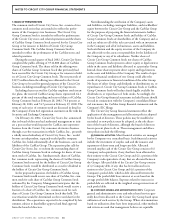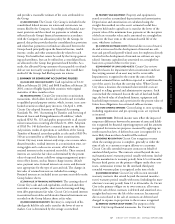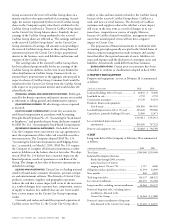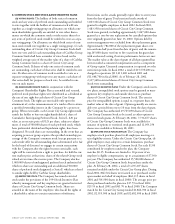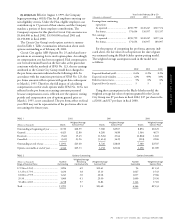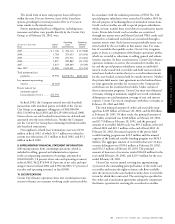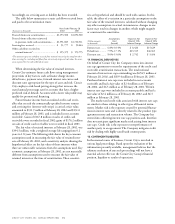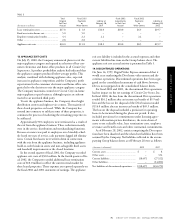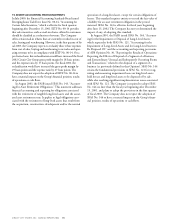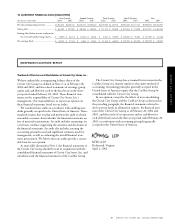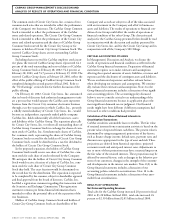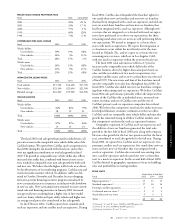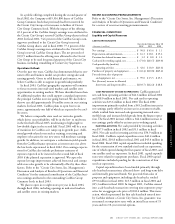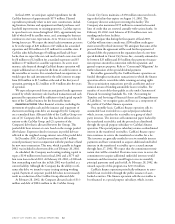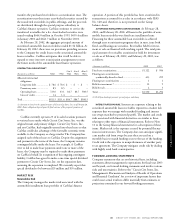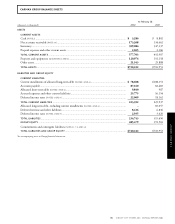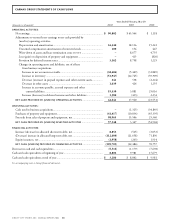CarMax 2002 Annual Report Download - page 78
Download and view the complete annual report
Please find page 78 of the 2002 CarMax annual report below. You can navigate through the pages in the report by either clicking on the pages listed below, or by using the keyword search tool below to find specific information within the annual report.
15. RECENT ACCOUNTING PRONOUNCEMENTS
In July 2000, the Financial Accounting Standards Board issued
Emerging Issues Task Force Issue No. 00-14, “Accounting for
Certain Sales Incentives,” which is effective for fiscal quarters
beginning after December 15, 2001. EITF No. 00-14 provides
that sales incentives, such as mail-in rebates, offered to customers
should be classified as a reduction of revenue. The Company
offers certain mail-in rebates that are currently recorded in cost of
sales, buying and warehousing. However, in the first quarter of fis-
cal 2003, the Company expects to reclassify these rebate expenses
from cost of sales, buying and warehousing to net sales and oper-
ating revenues to be in compliance with EITF No. 00-14. On a
pro forma basis, this reclassification would have increased the fiscal
2002 Circuit City Group gross profit margin by 18 basis points
and the expense ratio by 17 basis points. For fiscal 2001, the
reclassification would have increased the gross profit margin by
29 basis points and the expense ratio by 27 basis points. The
Company does not expect the adoption of EITF No. 00-14 to
have a material impact on the Group’s financial position, results
of operations or cash flows.
In August 2001, the FASB issued SFAS No. 143, “Account-
ing For Asset Retirement Obligations.” This statement addresses
financial accounting and reporting for obligations associated
with the retirement of tangible long-lived assets and the associ-
ated asset retirement costs. It applies to legal obligations asso-
ciated with the retirement of long-lived assets that result from
the acquisition, construction, development and/or the normal
operation of a long-lived asset, except for certain obligations of
lessees. This standard requires entities to record the fair value of
a liability for an asset retirement obligation in the period
incurred. SFAS No. 143 is effective for fiscal years beginning
after June 15, 2002. The Company has not yet determined the
impact, if any, of adopting this standard.
In August 2001, the FASB issued SFAS No. 144, “Account-
ing for the Impairment or Disposal of Long-Lived Assets,”
which supersedes both SFAS No. 121, “Accounting for the
Impairment of Long-Lived Assets and for Long-Lived Assets to
Be Disposed Of,” and the accounting and reporting provisions
of APB Opinion No. 30, “Reporting the Results of Operations-
Reporting the Effects of Disposal of a Segment of a Business,
and Extraordinary, Unusual and Infrequently Occurring Events
and Transactions,” related to the disposal of a segment of a
business (as previously defined in that Opinion). SFAS No. 144
retains the fundamental provisions in SFAS No. 121 for recog-
nizing and measuring impairment losses on long-lived assets
held for use and long-lived assets to be disposed of by sale,
while also resolving significant implementation issues associated
with SFAS No. 121. The Company is required to adopt SFAS
No. 144 no later than the fiscal year beginning after December
15, 2001, and plans to adopt the provisions in the first quarter
of fiscal 2003. The Company does not expect the adoption of
SFAS No. 144 to have a material impact on the Group’s finan-
cial position, results of operations or cash flows.
CIRCUIT CITY STORES, INC. ANNUAL REPORT 2002 76


